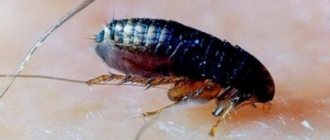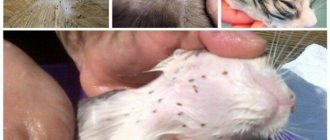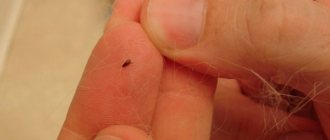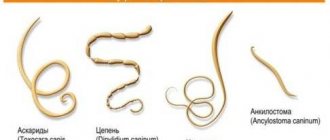Related Posts
- How to find out that a cat has fleas, and what to do in this situation?
Flea collar for cats - reviews of use- Flea: all the facts about parasites
Every pet owner must know where a domestic cat gets fleas , how to detect them, and how you can help your pet. A flea is a dangerous insect that can cause serious harm to the physical and mental health of an animal. Timely treatment will save the cat and protect it from re-infection.
Ways of flea infection
Fleas live for about 2 years, tolerate cold and heat well, and can go for months without food. If there is no one nearby whose blood you can profit from, the insect’s vital activity freezes, the flea falls into a state of hibernation. But as soon as the victim is nearby, the parasite immediately becomes active and attacks.
Answering the question of where do fleas come from in cats, we can name several ways of becoming infected with parasites:
- The cause of fleas may be contact with an infected animal;
- you can pick up a parasite while walking (fleas jump on an animal when it passes by);
- during a hunt (if the cat catches a mouse or rat infected with fleas).
Flea
A person can bring fleas or their larvae home on shoes or clothes; this often explains where fleas came from in a domestic cat that does not leave the apartment.
Where do fleas come from?
Some owners of pet cats are confident that a pet that does not come into contact with street animals cannot become infected with fleas. But this is a fundamentally erroneous opinion, since transmission from one animal to another is only one way of infection. And parasites, like their larvae, can be found on grass, soil, trees and other objects near which a cat walks.
If a pet goes for street walks, then the probability of infection is almost 100%. The likelihood also increases if there is a dog or other animals in the house.
But even if the animal does not go for walks and stays exclusively within the house, there are many options for infection. For residents of the first floors of apartment buildings, the problem of infection is especially pressing. Many houses have basements where stray animals or rats live, which are carriers of fleas. The latter, in search of new food, can go to nearby apartments and even get to the second or third floors.
But even in apartments located on the upper floors, in the complete absence of walks and contact with other animals, a domestic cat has every chance of becoming infected:
- through street shoes or clothing of family members (flea larvae are usually transmitted this way, but adults can also be carried);
- during an accidental exit into the entrance, especially considering the jumping ability of fleas and their ability to move long distances;
- when visiting a veterinary clinic, since homeless infected animals are often brought here;
- in the case of participation in competitions or exhibitions, where the risk of infection increases several times, since the owners of participating animals may not pay due attention to anti-parasitic treatment, and some may not even suspect infection;
- when visiting guests who also have pets infected with parasites;
- when traveling on public transport: even when using a special carrier, fleas can get inside through holes in the body.
The eggs of parasites land on various objects in the house, where they mature over time, and the adults immediately look for a host. For a certain time, it can become a person who, sooner or later, will convey them to the pet.
Can a domestic cat get fleas?
Fleas often appear in cats that live at home and do not go outside at all. This can happen in several cases:
- There are also pets in the house who go for walks, and they shared fleas with the cat;
- the animal met its owner who came from the street, who brought fleas on his clothes;
- insects got into the apartment from neighbors, from the basement, from the landing, from the wind through the window;
- the cat was attacked by insects or larvae that had been living in the house for a long time.
Even if only one insect accidentally gets into the house, after a few days the number of parasites will increase significantly. Considering how easy it is for parasites to get into the house, owners of mustachioed pets should not be surprised why a domestic cat has fleas.
Where do fleas come from in a domestic cat and cat if he does not go outside?
A domestic cat becomes infected with small bloodsuckers when:
- Invasion of a flea family on a person. It's easy to find out. Adults and eggs are easily carried on outdoor shoes and outerwear.
- Exit to the landing. There are no fewer fleas living in a doorway than on the street. The danger increases for residents of apartments located on the ground floor. They may appear in the apartment. The proximity of the basement causes a concentration of infected stray animals.
- Direct interaction with an infected person. Parasites can also appear from rats that have entered the house. A cat can also become infected from a foster cat. It is easy to determine if there are parasites on the fur.
Dangerous ectoparasites cause discomfort to animals
How can you tell if a cat has fleas?
In the first days after infection, it is quite difficult to notice fleas on a domestic cat. While there are only a few insects, they do not cause much discomfort to the pet, so its behavior practically does not change, except that it itches more often than usual. But parasites multiply quickly and very soon the symptoms that a cat has fleas become fully apparent.
These include:
- change in behavior - due to constant increasing itching and pain from insect bites, the animal becomes nervous, meows pitifully, often itches, and over time scratches the skin until abrasions appear;
- loss of appetite;
- restless sleep;
- By parting the fur, you can see dark grains - insect excrement, and over time, the parasites themselves.
Soon after your cat gets fleas, you may notice crusty sores on her skin.
Symptoms of fleas
At first, parasitic insects do not show themselves in any way. But as the population of the colony of bloodsuckers grows, symptoms will appear that the owner of the animal cannot help but pay attention to.
- Severe feline anxiety due to increasing itching. A cat or cat is constantly itching, sometimes you can even see them biting into the fur.
- Scratched areas appear on the animal's skin that hardly heal.
- If you part the fur on the neck or belly, you can find small black particles - flea excrement.
- In advanced cases, the fur becomes thinner, fistulas or abscesses, and allergic dermatitis can form.
This is also interesting: Is your cat constantly itching? Are there any fleas? What is the reason??
Main habitats of fleas
Fleas can spread throughout the apartment, but usually do not climb higher than 1 m from the floor. The most common places where fleas can live are:
- baseboards, cracks;
- cushioned furniture;
- door mats, carpets and carpeting;
- Stuffed Toys;
- cat houses and beds;
- bed.
You can get infected at any time
Knowing that fleas can jump up to 30 cm forward and up to 20 cm up, it is no longer surprising that as soon as a cat appears in a room where parasites live, it will immediately be attacked.
How dangerous are fleas on a cat?
Fleas are the cause of deterioration of the skin and coat of domestic cats. Many animals develop skin diseases and develop allergies to insect bites. By licking itself, the animal swallows the fleas and worm eggs that they carry. So it is a very common situation when, soon after a pet has fleas, worms are also discovered.
Flea allergic dermatitis
Flea saliva contains complex chemical compounds that, when bitten, enter the animal's bloodstream and can cause an allergic reaction in the form of inflammation on the skin. The situation is complicated by the fact that severe itching forces the cat to scratch the skin until open wounds form. All this contributes to the development of dermatitis, which progresses rapidly.
It is necessary to combat flea dermatitis comprehensively, destroying parasites and using antipruritic and antihistamine drugs.
Anemia in kittens
Each flea bite takes a little blood from your pet. With extensive infestation, this can cause anemia, especially in small kittens. To treat the disease, it is not enough to rid the kitten of parasites (although this step is required). Treatment includes taking medications aimed at normalizing blood composition and strengthening the general condition of the animal.
Infectious and parasitic danger of fleas, hemobartonellosis and dipylidia
Fleas are carriers of infectious diseases and helminthic infestations.
Blood-sucking parasites can cause the development of hemobartonellosis , a bacterial infection characterized by damage to red blood cells, changes in blood properties and, as a result, disruption of the normal functioning of the entire body. The disease cannot always be completely cured; in some cases, the cat may still have kidney or liver failure.
Dipylidia is another flea-borne disease.
This is a helminthiasis caused by the cucumber tapeworm. A pet can become infected if it swallows an adult flea that carries the pathogen.
Why are cat fleas dangerous?
Infection with them is dangerous not only because of the deterioration of your pet’s general condition; there are also other reasons why you should rid your animal of these parasites as quickly as possible. These are diseases that are transmitted by fleas and can be dangerous for both the cat and its owners.
Danger for cats
In addition to a noticeable deterioration in physical and mental condition, fleas very often cause allergic dermatitis. Also, these insects are carriers of helminths. To date, it has been proven that these parasites are intermediate hosts of several dozen species of worms. The larvae feed on worm eggs, and they are also stored inside the adult insect. A cat may well become infected with helminths by biting into insects.
Fleas are carriers of infectious anemia - hemobartonellosis, which leads to a decrease in red blood cells in the animal's blood. They also carry dangerous fungal and viral diseases. Among them are mycoplasmosis - it affects various organs, as well as rickettsiosis - a disease characterized by a febrile state of the animal.
Severe infestation with them can lead to complete or partial baldness of the pet - the lost hair will never grow back. In addition, your pet may develop serious mental problems.
Danger for kittens, pregnant and lactating cats
Fleas pose an even greater danger to kittens. A fragile body is not able to fight parasites, so they often cause their death. Flea infestation in kittens leads to the following consequences:
- rapid weight loss and cessation of growth;
- the occurrence of anemia.
It is this disease that most often causes the death of an animal.
Parasites are also dangerous for pregnant cats. They deprive them of nutrients and weaken the animal. There is one more point - many of the anti-flea drugs are toxic. Their entry into the body of a pregnant woman can negatively affect the offspring. The situation is similar with feeding animals. Veterinarians advise to carry out the destruction of parasites before future mating, so you can avoid the harmful effects of parasites and medications.
Danger to humans
Cat fleas also bite humans, although they do so reluctantly and quite rarely. As mentioned above, these insects have a rather narrow specialization and prefer to feed on the blood of one host. Bites are fraught with both minor troubles and serious consequences, in the form of dangerous diseases carried by parasites.
When bitten, the parasite injects an anesthetic and an anticoagulant into the victim's body, which prevents blood clotting. Both of these proteins are foreign to us, and the human immune system instantly reacts to this - an allergic reaction begins (itching, burning, inflammation). Multiple bites disfigure the skin, it becomes covered with wounds and scratches. The legs suffer the most; the insect can jump up to about a person’s knee.
There is another danger - diseases that fleas carry:
- pulicosis;
- massive dermatitis;
- dipylidosis;
- brucellosis;
- creeping erythema;
- anthrax.
Are fleas dangerous for humans?
Although cat fleas do not live on humans, they can cause serious health problems. This is mainly due to the fact that parasites are carriers of dangerous diseases that they can transmit to a person at the time of their bite. Among them:
- brucellosis;
- anthrax;
- plague;
- sarcopsillosis;
- hepatitis B and C;
- typhus.
On a person
All these diseases are characterized by severe course and unfavorable prognosis. They often lead to disability and, in the worst case, death. But even if the worst does not happen, flea bites can cause unwanted reactions in the body:
- allergy;
- various types of dermatitis;
- skin irritation, rash, itching;
- helminthiasis (infection occurs if a person accidentally swallows a flea that is a carrier of the helminth).
These reasons are significant enough to understand that getting rid of fleas as quickly as possible will protect not only pets, but also their owners from danger.
How to remove fleas from cats?
If your cat has fleas, you need to take immediate action. The sooner treatment is started, the easier it will be to get a positive result and avoid serious complications. There are many products for treating cats against ectoparasites. They come in different forms:
- shampoos;
- drops;
- sprays;
- powders;
- pills;
- collars;
- keychains.
Preparations for treating cats against fleas contain insecticides that kill insects, their eggs and larvae in a short time. Most of the active substances included in medications are toxic, so they must be used in strict accordance with the instructions. For the same reason, you cannot use several different insecticides at the same time, as this can cause poisoning of the animal.
Many people prefer to use broad-spectrum drugs that work against both ectoparasites and helminths.
After removing insects, it is equally important to protect your pet from their reappearance. To do this, they use repellents - means that repel parasites. Most often these are drops, sprays or collars.
How to protect cats from fleas?
To avoid flea infestation of their pets, caring owners take preventive measures:
- regularly check your pet for fleas;
- treat cats with drugs against ectoparasites;
- maintain cleanliness in the apartment;
- periodically wash the cat's bedding, treat the bed, house, and, if necessary, the entire room with anti-flea agents;
- control the pet’s contacts (this is especially important on the street to prevent communication with stray animals).
Animal processing
In addition, you should regularly visit a veterinarian, who can determine the presence of fleas and worms at an early stage and recommend an effective remedy for them.











